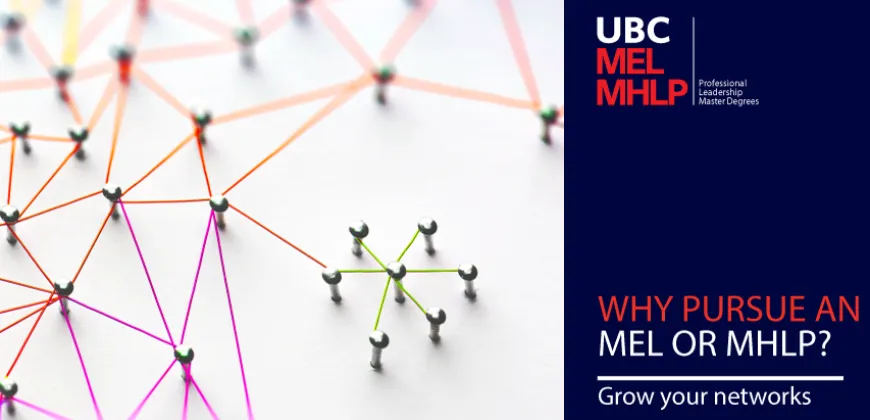Grow your network to create opportunities

One of your most important assets is your network. The individuals you have professional connections with both within and outside your industry can lead you to new career opportunities, offer insightful perspectives, and support you in your own decision-making and professional development. Just as importantly, your network gives you opportunities to do the same for others. UBC’s Master of Engineering Leadership (MEL) and Master of Health Leadership & Policy (MHLP) were intentionally designed to help students to grow their networks by building meaningful relationships with other students, instructors and industry leaders. Courses are discussion-based and often involve group projects, enabling you to really get to know your fellow students. Capstone projects, practicums and industry-driven projects create opportunities to connect with local leaders in your sector.
Conferences and industry networking events provide other pathways to meet leaders in your field and expand your connections.
Connecting with other professionals
The MEL and MHLP include 10 programs that offer a balanced curriculum of sector-specific courses and business courses. In the sector-specific courses, you’ll be learning alongside students with a broadly similar educational background who have at least three years of professional experience in their industry.
The business and leadership courses that make up about half the curriculum bring together students from across all MEL and MHLP programs, which means you’ll be working with people from industries that could include healthcare, engineering, urban planning and architecture.
All courses are interactive discussion-based learning environments that require you to work on numerous group projects. This creates unique opportunities for you to connect with similar professionals with a diverse background of professional experiences, share a wealth of knowledge, and learn from each other while collaborating to solve issues and challenges.
Building relationships with leaders in your industry
The MEL and MHLP have project-based curricula, with some programs incorporating capstone projects and practicums with industry partners. These are excellent opportunities to develop one-on-one relationships with people working in your field. (See the article Broadening your experience through projects, practicums and capstones for more.) Each year, the MEL and MHLP host dozens of learning and networking events that create other avenues for you to broaden and diversify your connections. These events include guest speaker series that bring in industry experts, entrepreneurs and alumni to share their insights.
MEL and MHLP instructors are highly respected leaders in their field with strong connections to local industry.
Many instructors invite their peers from the private and public sectors to lead specific classes and share perspectives. Finally, depending on your program, you may have opportunities to attend industry conferences – another great way to meet people in your area of interest.
Support to reaching out
While the programs are structured to help you expand your professional network, it’s up to each student to do so. Professional development events held throughout the year offer tips on how to use LinkedIn – among other tools – to confidently reach out to both acquaintances and strangers to build your network. (See some tips for network building in this article in Forbes magazine.)
Creating and using networks
MEL and MHLP students consistently say that the professional networks they’ve developed through their degrees are one of the most valuable elements of the program. These networks have led to friendships, job opportunities, knowledge-sharing and more. Carlie Owen, a graduate of the MEL in Clean Energy Engineering, used LinkedIn to find local industry leaders in her field and then contacted them to set up informational interviews to learn more about the work their organization was doing in the field of clean energy.
“When you’re a student, people are quite willing to give you their time and tell you about their work and organization,” she says. “As a student, you’re not asking for a job at that point – you’re building relationships and learning from professionals in the field.”
Her investment paid off: Not only did she expand her understanding of the types of opportunities available in Vancouver and the clean energy sector as a whole, but she made connections that led directly to her capstone project and her current job. Other students have also landed jobs based on connections made by attending conferences or working on capstone projects or practicums. But the value of networking is not just getting a sought-after position. It’s creating a web of connections with diverse people and a better understanding of the value you can add to your role, your industry and others.
As summed up by Kristen Law, a 2020 graduate of the MHLP in Clinical Education: “Network, network, network! The program instructors emphasize this a lot, and it’s true: you never know who you are going to meet and you can never cultivate too many relationships.”





